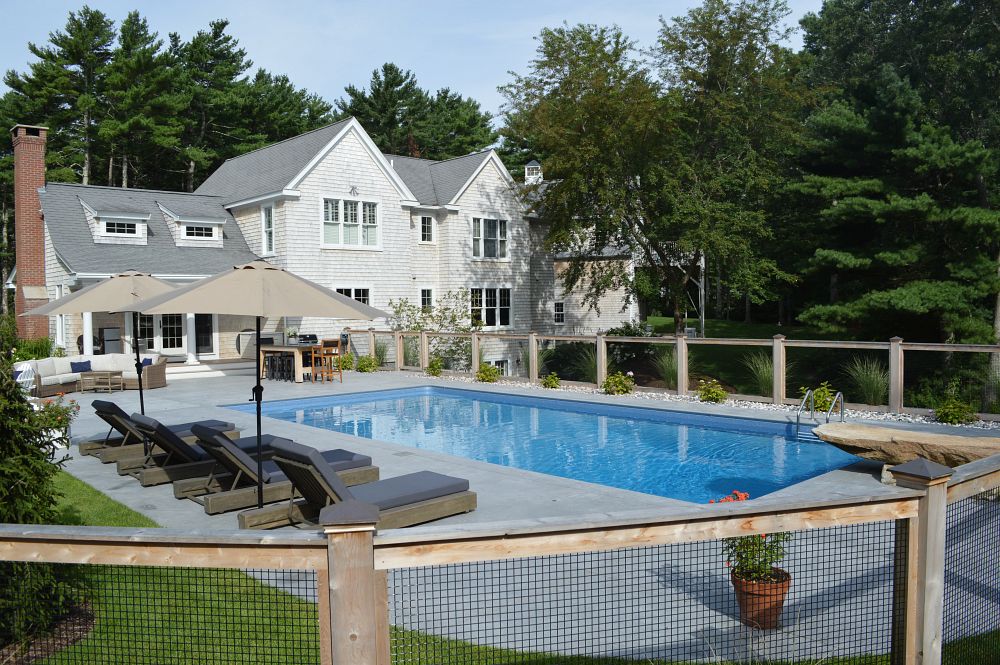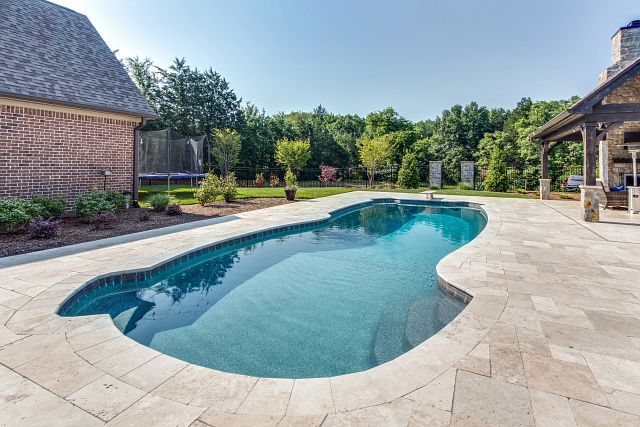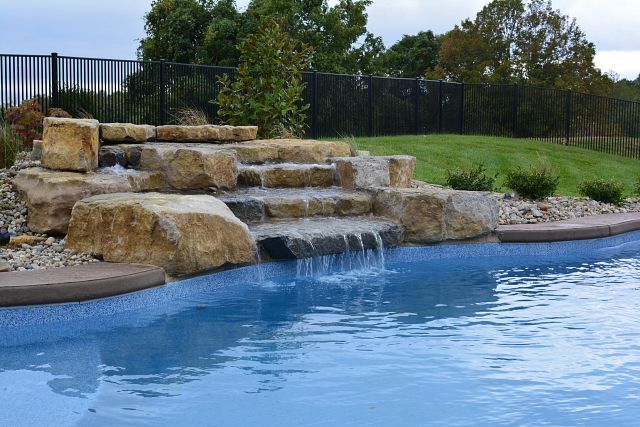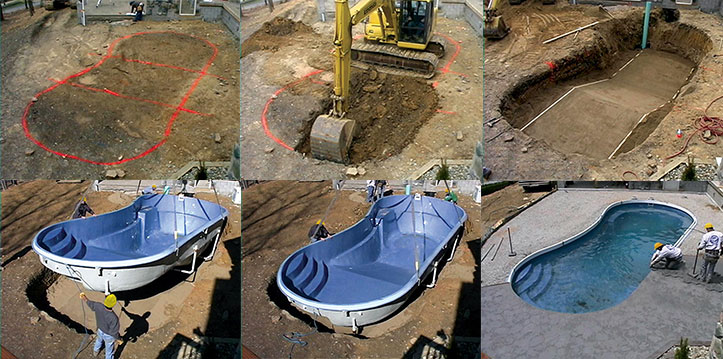There’s nothing quite like a hot Georgia summer: sitting poolside and sipping a cold glass of sweet tea, watching the Braves’ game on a big projector screen while the kids are happily splashing around.
An inground swimming pool can be a fantastic addition to your Georgia home, eliminating the need to haul the family to neighboring Florida beaches and creating a getaway in your own backyard. Dubbed “the Empire State of the South,” Georgia is the perfect mix of bustling urban culture and rural beauty.
If you’re thinking about investing in a brand new pool, remember that your pool itself is just one part of the picture. Think about how your pool will fit into your backyard – and your lifestyle. You’ll want to consider things like decking to surround your pool and landscaping to create an inviting outdoor oasis. Depending on the 360 vision you have for your pool and backyard, you may want to offset your pool with a designated area for grilling and hosting cookouts, or a pretty pergola with a canopy to offer shade.
Since Georgia has mild weather all year, you might also want to consider features to help you get even more use out of your pool. For instance, adding a heater or spillover spa can help you get more mileage out of your pool during autumn, while an automatic pool cover can help reduce energy costs and maintenance.
To help you make the best choice for you and your family, we’ll walk you through the benefits of fiberglass and vinyl liner pools, maintenance tips, and several key state and local regulations for pool owners in Georgia. Let’s dive in!
Fiberglass Pools for GA
With their smooth and shimmering gel coat, fiberglass pools are a striking addition to any backyard. But they’re more than just a pretty face! Fiberglass pools are known for their strength, durability and ease of maintenance. They’re comfortable underfoot when wading in and won’t snag your swimsuit while frolicking in the waters.
Whether you live in a thriving urban area like Atlanta or Augusta, or have a vacation home in the Blue Ridge of North Georgia, fiberglass pools have a lot to offer. Hot, humid summers and its mild winters make owning a pool an appealing option for Georgians who live in “The Peach State” year-round. Their low-maintenance nature makes fiberglass pools an ideal option for part-time Georgia residents who might not be around to tend to their pool as frequently as full-time residents.
As an added benefit, fiberglass pool shells are manufactured off-site and transported into an excavated area in your backyard. These prefabricated fiberglass pools can be installed faster, allowing you to start enjoying your pool sooner.
Learn more about the benefits of owning a fiberglass pool.
Mold and Algae-Resistant
Georgia is known for hot, humid summers, with average temperatures ranging from the high 80s to more than 100 degrees Fahrenheit. Even September weather in Georgia can swing between the low 80s and high 90s! Relatively mild year-round temperatures make The Peach State an ideal one for a pool. However, whether you live in the bustling heart of “Hotlanta” or quaint Newnan – the City of Homes, Georgia’s humid weather can create ideal conditions for pools to more easily develop algae and mold.
Fiberglass pools, with their smooth, gel-coated surface are less prone to having algae cling to these pools, making them a low-maintenance option for Georgia residents dreaming of a new pool. Additionally, a well-maintained vinyl liner pool can offer comparable resistance to pool algae.
Large vs Small Inground Fiberglass Pools in Georgia
Do you want to live large with a big, beautiful pool that stands as the epicenter of backyard life? Or do you have a smaller yard and want a pool that can comfortably nestle into your backyard – without sacrificing any of the splashy add-ons that can enhance the fun? At Latham, we believe there’s a pool for every home.
The first step in choosing the right pool for your home is to learn more about your options – and how those options can best suit your lifestyle and what you hope to get out of your pool.
For starters, pools come in a range of shapes and sizes, from the crisp, clean lines of a rectangular pool to the winding curves of a freeform pool. Fiberglass pools also come in a variety of shapes, sizes and colors. But when it comes to pool design, choosing a shape is just one part of the equation.
When planning your pool, think about how you plan to use it and who will use it:
- Do you have young children or teens?
- Will they bring friends over to use the pool?
- Will seniors or mobility compromised individuals use the pool?
- What safety features do you need in order for everyone to enjoy your pool safely?
- How often do you plan to use your pool? Will this be for a vacation home or your permanent residence?
- Do you want your pool to be the main focal point of your backyard? Or do you want to incorporate it alongside other features like an outdoor grilling station or garden?
- Do you like entertaining? If so, how many people do you typically have at your backyard get-togethers?
- Do you plan to use your pool for exercise, relaxation or both?
You’ll also want to balance those considerations alongside any practical features or those required by your state and local governing bodies. For instance, Georgia requires all pool owners to have a fence that meets state and local regulations. Additionally, Georgia mandates that residential pools with a depth greater than 5 feet should have secondary entries and exits in the deep end of the pool. This can take the form of built-in stairs, or swim ladders. With these constraints in mind, you may want to factor fencing and multiple entry points into your budget, as well.
An autocover can be another wise investment that pays off in the long run. Not only can it help you cut back on pool maintenance and reduce water evaporation (which can be especially important if you’re using your pool during a Georgia drought), but autocovers can be a safety barrier used prevent kids and pets from accidentally falling in when your pool is unattended. This can be an important add-on to consider, especially if your pool will be part of a second home or vacation property in Georgia and you’re not there to monitor your pool to guard against unsupervised use.
When envisioning the big picture for your pool, you’ll also want to balance those considerations with the size, shape, and geographic features of your backyard. For instance, if you have a smaller backyard or if your property sits on a slope or hill, that may narrow the field for your pool choices. A licensed professional pool builder can help you better understand your options and help you to build a pool that both works with the natural constraints of your backyard as well as deliver the lifestyle and fun factor you dream of having with your pool.
Check out some breathtaking examples of pools that Latham has helped build throughout Georgia. Don’t see something that looks like your ideal pool? Don’t worry! Just because you don’t see it, doesn’t mean it’s not possible to build. Contact a local independent builder to view even more photos and videos of pools in their portfolio that might not be available online just yet.
Considerations for a Smaller Pool
Good things come in small packages! That’s especially true of smaller pools, which offer just as much fun as their larger counterparts. There may be a number of reasons why you’re considering a small pool.
For instance, if you live in a large, metropolitan area like Atlanta, Augusta or Savannah, or a densely-populated area that straddles urban and suburban living like Sandy Springs, GA, you may have a smaller backyard. That said, there are plenty of compact options that bring a lot to the (picnic) table when choosing a pool for a smaller yard.
For example, the 10’ x 20’ kidney-shaped Jamaica is one of our smallest options that’s still packed with fun features. Swim-up seating can pull double duty as a beverage bench, while slip-resistant steps make it a great fit for young children, seniors or mobility-compromised individuals.
Plunge pools like the 10’ x 16’ Milan are an even more compact model that’s a great option for entertaining in your backyard. Swim-up seating and benches around the pool’s perimeter accommodate plenty of guests who only want to be partially submerged, while the pool’s 16’ length makes it great for swimming laps and squeezing in some exercise when company goes home!
Georgia has a booming tourist (and film!) industry, making it attractive for people from around the country to enjoy warm weather and scenic beauty – with vibrant city life just around the corner from quaint wooded areas and lush greenery. Smaller pools can be a great fit for vacation homes, giving you less pool to maintain when you’re not on the property. If you own a rental property and plan to allow visitors to use your pool, be sure that you carefully review any state and local laws around pool safety – including proper maintenance and fencing, as well as how doing so may impact your insurance policy and any leasing agreements.
Another reason Georgia residents may want to choose a smaller pool is their stage of life. Although fiberglass pools are easy to maintain, a more compact size means less pool to take care of, walking its length to skim or test and treat water each week. For retirees considering a pool, a smaller pool still offers the same feel of luxury along with reduced maintenance, giving you a place to unwind without having to schlep to Tybee or Jekyll Island for a weekend. Plus, owning a pool is a great way to convince the grandkids to come visit and play!
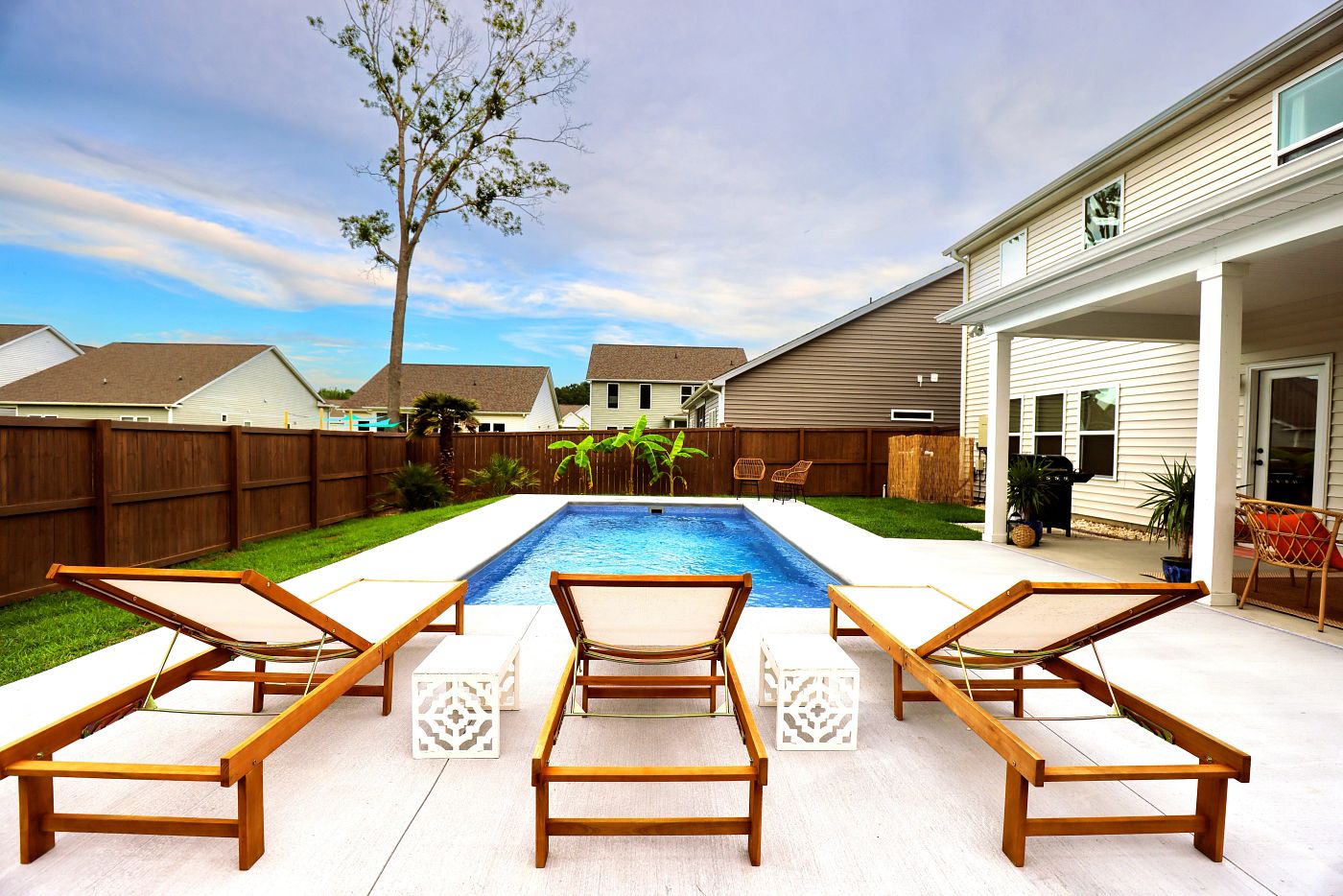
Considerations for a Larger Pool
For those who live in larger more rural or suburban areas of Georgia, like Newnan or McDonough, a spacious fiberglass swimming pool can help you serve up a generous slab of Southern hospitality from the confines of your own backyard.
A large pool can be an enticing option for homeowners who love to entertain friends and family. Imagine kicking back in a luxurious rectangular-shaped pool like the Enchantment 9.24. Slip-resistant steps and an ultra wide top step can double as a tanning ledge, making it easy for you to get in and out of the pool to grill up some burgers and hot dogs while your guests enjoy its built-in beverage benches – cheering on the Braves, the Bulldogs, or the Falcons – depending on the time of year!
For those who want to get even more mileage from their pool after the sun goes down or once “hoodie weather” kicks in, the Cancun Deluxe offers a built-in spillover spa alongside a variety of other features. Non-slip steps, a tanning ledge, swim-up seating, and multiple entry and exit points make this large-and-in-charge freeform fiberglass pool … well… Deluxe!
For property owners who are looking to capitalize on Georgia’s booming tourist industry, a big pool can translate to more bookings from large parties looking to rent your beach house or cabin.
Georgia’s lower cost of living also makes a pool an appealing option. On average, the cost of living in The Peach State is 11.2% lower than the rest of the country, putting it as the fifth lowest in the US. The state’s 4% statewide sales tax and local sales taxes capped at a maximum of 5% also sweeten the deal for those considering purchasing a larger pool and increasing their return on investment.
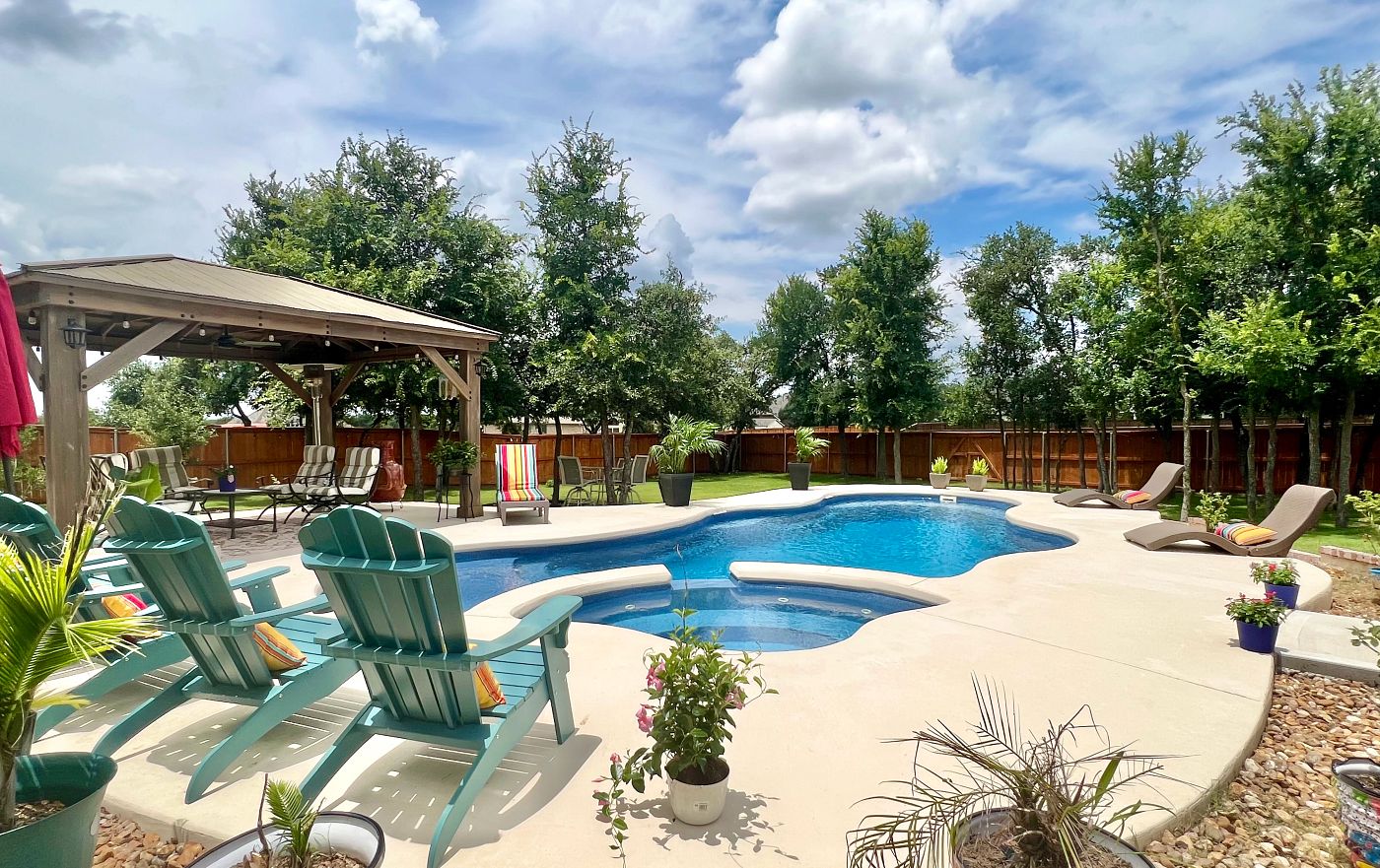
Inground Vinyl Liner Pools in GA
Inground vinyl liner pools are another excellent choice for Georgia residents considering taking the plunge into pool ownership. Durable, low maintenance, and cost-effective, vinyl liner pools can offer even more avenues for personalizing your pool with add-ons.
Vinyl Liner Pool Designs for Georgia Homes
If they say “get in where you fit in,” the highly customizable nature of vinyl liner pools make them an outstanding option that can work with nearly any size yard, budget, or taste profile.
Vinyl liner pools are a budget-friendly option that allows you to customize their design from top to bottom. Because of this flexibility of design, choosing a vinyl liner pool allows you to add on exciting upgrades like water features, tanning ledges – and even jaw-dropping fire features.
Benefits of Vinyl Liner Pools for Georgia Backyards
Among their many benefits, vinyl liner pools are highly customizable at a more affordable price point. From choosing your pool’s shape and size, to selecting liner colors or patterns, vinyl liner pools give you the flexibility to customize every aspect of your pool. Your builder can also help you select add-ons that will help you achieve the look and experience you want. Whether you crave the relaxing space of a tanning ledge or kid-friendly bubblers and water slides, or multiple entry points for swimmers who tire easily, a vinyl liner pool gives you endless options in terms of extras!
Although they require slightly more maintenance than their fiberglass counterparts, vinyl liner pools require considerably less maintenance compared to older materials like concrete or gunite. And a well-maintained vinyl liner pool has a greater resistance to developing algae bloom, especially when compared to older concrete pools that are more porous and rough. Given Georgia’s scorching summers and mild year-round weather, this is an especially attractive benefit of vinyl liner pools, which can help to minimize maintenance.
And while caring for a vinyl liner pool requires a little more elbow grease than a fiberglass pool, their overall cost savings make the slightly extra effort worth it!
To whet your appetite, feast your eyes on some breathtaking vinyl liner pools that Latham has constructed throughout Georgia. These are just a sampling of pools our team has brought to life, so if you don’t see one that resembles your dream pool, that doesn’t mean it’s not possible! A local independent builder can show you even more photos and videos of vinyl liner pools in their portfolio that may not currently be available online.
Flexible Designs for Any Lifestyle
One of the best parts of owning a vinyl liner pool is that they can be tailored to work with your lifestyle today – and tomorrow!
With a vinyl liner pool, you’re not locked into a particular size or shape forever. These pools are poured into place, based on specific customizations you and your builder work through in order to create your dream pool. Whether you live in a crowded urban neighborhood or a spacious suburban enclave, a vinyl liner pool can be designed to work with your yard and surroundings.
You can also easily remove and add new features over time. If an at-home miniature water park appeals to your kids – or the kid in you – add-ons like a water slide, colorful LED lights and bubble jets can be awesome additions that will make your vinyl liner pool the envy of the neighborhood. On the flipside, when your children have grown, you may want to transform your pool into a more relaxing sanctuary for you, giving you a space to entertain guests. A vinyl liner pool allows you to easily remove the water slide and replace it with features like a tanning ledge. This type of swap-out may require you to also replace your vinyl liner, so consider timing any pool makeovers alongside upgrading an older liner!
And if you decide you may want to entirely reshape your pool, making it smaller or larger in the years to come, a vinyl liner pool gives you that flexibility. For instance, maybe you own a vacation home in Georgia now and sporadically use your pool when visiting. Down the line, your vacation home might become your permanent residence after retiring. A smaller-sized pool may be better aligned with a more minimalist lifestyle to give you less pool to take care of, but still with plenty of pool to enjoy. With that in mind, a vinyl liner pool can accompany you through any season of life, giving you hours of enjoyment and years of memories to make now and well into the future.
Transforming or Replacing Your Current Pool
If you purchased a home with an older concrete or gunite pool, it might be time to renovate an older pool. A vinyl liner pool can give you an affordable and easy-to-maintain way to upgrade an older concrete pool.
Even the best-kept concrete pools can be costly and challenging to maintain. Because concrete pools are porous, they can more easily develop algae bloom. The bane of any pool owner’s existence, algae can deposit ugly stains on the surface of your pool and can compromise your pool’s water chemistry, locking you in a seemingly endless cycle of balancing your pool and leaving you with less time to enjoy it.
Given Georgia’s hot, humid and muggy climate, conditions can be ripe for a pool to develop algae. Both fiberglass and a well-maintained vinyl liner pool can help lessen the risk of algae bloom, giving you a smooth, easy-to-clean surface that offers greater resistance to a common pool problem.
Vinyl liner pools are a less-costly option up-front, but can help you save money in the long haul. Older concrete pools can get rough and chalky with age, requiring a good resurfacing facing once every 10 years, as these materials are porous, more prone to and can get rough and chalky with age. By contrast, a well-maintained vinyl liner can last for up to 10 years. Even so, replacing a liner is far less expensive than a full resurfacing of an older concrete pool!
When should you replace your vinyl liner or update your pool?
A well-maintained vinyl liner can last for up to 10 years. Due to Georgia’s hot, humid weather, if you’re not properly maintaining your liner with a gentle weekly cleaning, you may need to replace it sooner due to algae growth and build-up. So, be sure to stay on top of routine maintenance tasks and your longer-lived liner will thank you for it!
Inspect your liner each month to check for any small tears. These little nicks can be patched, preventing it from becoming larger and leading to leaks. If you have a large tear in your pool, be sure to replace your liner immediately, as a leak can lead to an imbalance in your water chemistry.
The time may come, however, when you decide you want to make changes to your pool. Times and styles change – as do your family’s needs. This may prompt you to renovate your pool, adding or subtracting features to help you get more enjoyment out of it.
Bear in mind that renovating your pool may require additional excavation and reshaping. However, a little planning beforehand can help you save time and money. Grander upgrades like adding pool lights, water features or installing stairs or slides should be done alongside more mundane renovations, such as replacing your vinyl liner. Adding new features can be invasive and would require you to remove and replace your liner anyway. So, a little extra planning can go a long way!
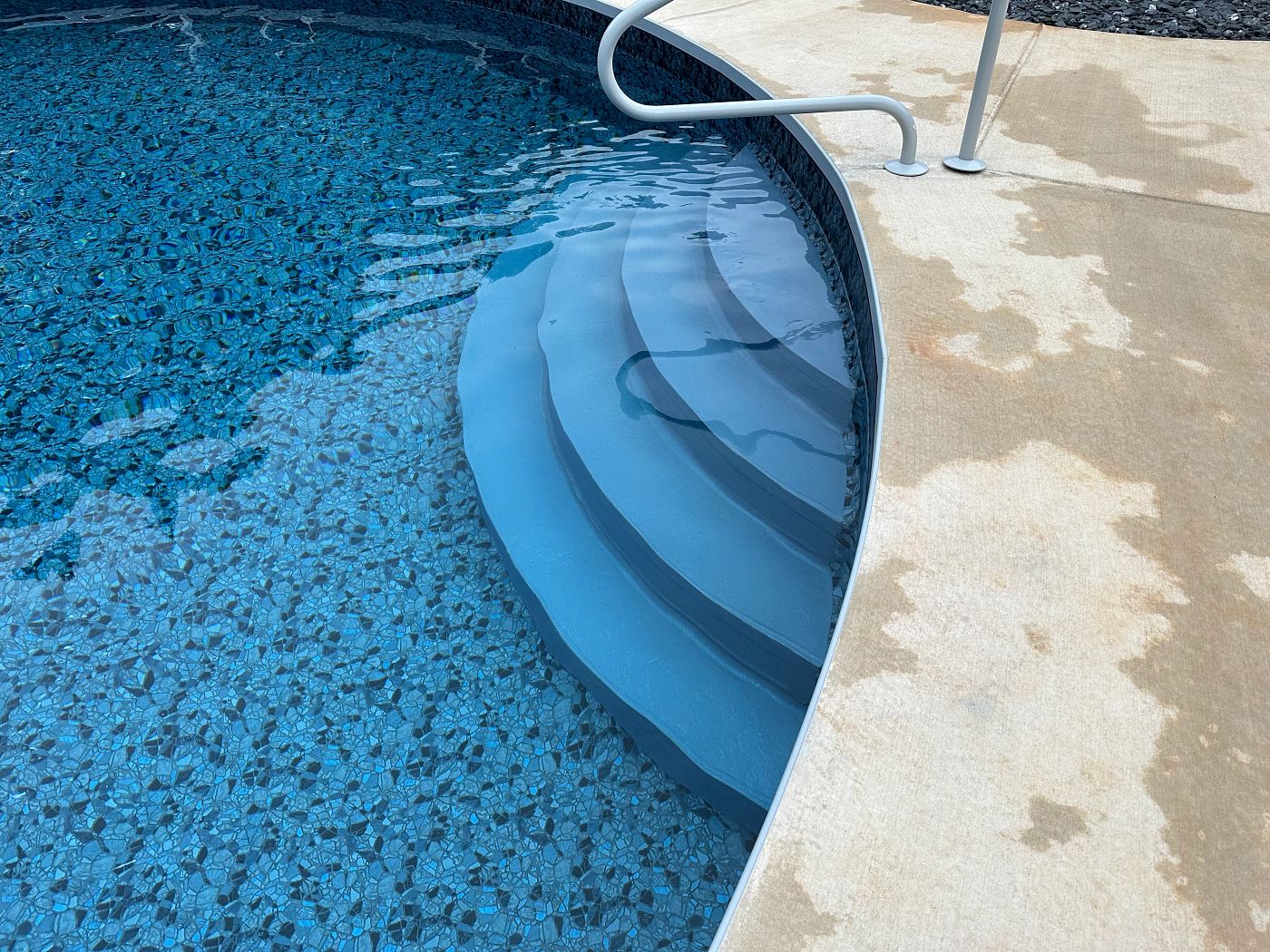
Installing Your Inground Pool in GA
If you’re thinking of installing an inground pool for your Georgia home, the Peach State’s mild year-round weather gives you plenty of time to plan and for your builders to begin excavating well in advance of prime pool weather. Because Georgia winters are typically above freezing – with average temperatures swinging between the low 60s and mid 30s in North and Central Georgia and considerably warmer in Southern GA, there’s little worry about the ground being too hard and cold to excavate space in your yard for a pool. You can typically begin planning your pool installation in late fall or early winter, with more than ample time for it to be completed before spring, ready to enjoy your pool when hot Georgia summers are in full swing!
One thing that can make installing a pool a bit more challenging is the state’s famed Georgia Red Clay in the Northern part of the state. Clay soil is often more expansive than other types of soil and capable of absorbing more water. This can cause the area around your pool to swell and create pressure on the structure of your pool, if improperly installed. A licensed professional builder will be knowledgeable about installing a pool on clay soil and building techniques to ensure your pool remains structurally sound.
On the flipside, the Upper and Lower Coastal Plains in Southern Georgia has an abundance of sandy soil that can shift more easily. Pools in areas with sandy soil may require more reinforcement and a retaining wall built to ensure your pool is properly situated.
Installing a Fiberglass Pool
One of the biggest benefits of a fiberglass pool is how quickly they can be installed. Because fiberglass pools are prefabricated off-site and transported to your backyard once it’s been excavated, it can dramatically speed up its installation time.
Learn more about installing a fiberglass pool.
Installing a Vinyl Pool
Installing a vinyl liner pool kicks off by measuring your yard and assessing the ground beneath the surface to ensure a precision build. As the process unfolds, your building team will begin excavating your backyard and taking any additional steps – including building a retaining wall or grading your land if it sits on a slope – to offer sheer pool perfection before your liner is sealed in place and your brand new pool is filled!
Learn more about installing a vinyl liner pool.
Georgia Rules and Regulations for Installing an Inground Pool
Before you can soak in the glory of becoming the proud owner of a beautiful new inground swimming pool, it’s important to familiarize yourself with some of the state and local requirements for owning a pool in Georgia.
Because state and local laws periodically change, it’s important to do your research and consult with local building offices and state regulations before the construction process begins. While some Georgia pool laws apply throughout the entire state, your city, county or municipality may have additional, potentially more rigid laws than those that blanket the state.
To ensure your pool is compliant with all state and local codes, be sure to investigate your responsibilities with your local building office. Working with a licensed professional builder can also help you better understand your responsibilities and that your pool is up-to-code.
With that in mind, here are some of the most common questions we get from prospective pool owners in Georgia.
How far does a pool need to be from the house in Georgia?
In Georgia, the distance between your swimming pool and home varies depending on where you live. Different cities and counties have their own requirements. In some instances, the distance between your home and pool may depend upon the size of your property. Typically, your pool itself and any pool equipment (including pumps, heaters, and filtration systems) must be at least 10 feet from your property line.
Because Georgia laws around pool ownership can change periodically and requirements can vary depending on your town or county, be sure to check with your local building office to confirm how far your pool needs to be from your home and any neighboring property lines. Working with a knowledgeable professional pool builder can help you better understand state and local pool regulations and ensure your pool is compliant.
Do I have to have a fence around my pool in Georgia?
Georgia law requires all residential pool owners to have a fence or barrier at least 4 feet high on all sides, surrounding their pool. This applies to any water-containing structure that can hold more than 24 inches (2 feet) of water, including swimming pools, hot tubs, spas and jacuzzis.
How tall does a fence around a pool have to be in Georgia?
Georgia requires fencing around all private residential swimming pools. To meet state guidelines, any fencing or barrier must be at least 4 feet high, and no higher than 4 inches from the ground, and with slats no further than 4 inches apart to prevent small children from slipping through. These gates must also be self-closing and self-latching with any latches placed no lower than 6 inches from the top of a 4 foot fence.
Although this law applies throughout Georgia, your town or county may have more stringent requirements around pool fencing. For instance, in Fayette County (which includes Fayetteville and Peachtree City) pool owners whose home forms part of the barrier surrounding a pool must also have either an alarm system that emits an audible warning when any doors, windows, or screens leading to the pool area are opened; an approved safety cover, or other approved means of protection including self-closing and self-latching doors. In Cherokee County (home to Canton and Woodstock, GA), pool fencing must meet the minimum height requirement of 5 feet tall, and it’s “recommended that fences be placed a minimum of 6 inches off the property line onto your property. Must be completely surrounded by a fence or barrier at least 48 inches (4 feet high).
Before breaking ground on your new pool, be sure to check with your local building office, as your city, town or county may have additional requirements around pool fencing.
Do you have to have a permit for a pool in Georgia?
Although the types of permits required can vary across cities, towns and counties throughout Georgia, you will likely need to apply for a permit in order to construct a pool on your residential property.
For instance, Snellville, GA requires that any homeowner interested in building a residential pool will need to obtain a building permit application, erosion control and solid waste management affidavit, as well as subcontractor and homeowner affidavits, if applicable. In addition, residents will also need approval from the Gwinnett County Environmental Health Department if their property has a private septic system before breaking ground on a new swimming pool.
Similarly, Cobb County, GA requires residents to secure a list of permits, including a pool and barrier application, pool and spa code contractor affidavit (which must be notarized), signed and sealed proposed pool design from a registered land surveyor, architect or professional engineer, customer contract and/or estimate, and other permits and documentation to ensure your pool meets all established codes and is built by a licensed professional.
Because rules and regulations for permitting can vary throughout the state, be sure to investigate beforehand. Working with a licensed professional builder can help you more easily navigate these laws and obtain the correct permits to construct your new pool.
Pool Covers and Winterizing Options to Protect Your Pool
Whether you choose a fiberglass or vinyl liner pool, an automatic pool cover can be a wise investment that can help you save on energy costs and maintenance, as well as help guard against pool-related accidents.
An autocover can help you save between 50% to 70% on energy costs. It can also help you reduce water evaporation and the need to rebalance your water chemistry. In seasons where Georgia experiences a drought and water restrictions, the ability to conserve water and reduce evaporation can mean the difference between having to sit out a stretch of pool season and being able to cool off in an enjoyable way in your own backyard.
Additionally, more than 60% of Georgia is covered in trees and lush greenery. An autocover can help reduce the amount of pollen and leaves that fall into your pool. Not only can this help you save time on skimming your pool, but can also reduce the risk of algae developing on your pool’s surface, given that leaves, pollen and Georgia’s high humidity can be a recipe for pool algae, if left untended. And if you have a vacation home in Georgia, an autocover can help you more easily get your pool up and running once you arrive.
Most importantly, autocovers can save lives, preventing kids and pets from accidentally falling in when your pool is unattended. An automatic pool cover can also help prevent uninvited guests from hopping your fence and using your pool without permission.
If you’re working with a smaller pool budget, many rectangular pool models are autocover-ready. More intricate shapes, such as freeform pools, may require a custom-cut autocover, which can cost more than a prefabricated cover.
Due to Georgia’s mild winters, a winter pool cover isn’t a necessity. Winter covers are used to close your pool for the season and made to support the weight of heavy snow that could otherwise damage the delicate mechanics of an autocover. Because the entire state of Georgia sees far less than a foot of snow total each year, it’s up to you to decide if you may also want a winter pool cover.
How to Maintain Your Georgia Pool
Both vinyl liner and fiberglass pools require minimal upkeep. Depending on the type of material you choose for your new pool, your maintenance schedule and checklist can vary in order to keep your pool looking and running its best.
Fiberglass Pool Maintenance
Fiberglass pools are as easy on the eyes as they are easy to maintain. To keep your fiberglass pool looking its best, schedule time each week for routine maintenance tasks, including emptying filter baskets, skimming and testing your pool’s water chemistry. Once each month, plan to check and back flush your filtration system to keep it functioning properly.
In preparation for colder weather, many Georgia residents can potentially extend “pool season” well into October if they have a heated pool or spillover spa. However, despite GA’s relative lack of snow, winter temperatures still aren’t quite mild enough to merit year-round use of your pool. Be sure to winterize your pool before cold weather sets in, taking care to remove water from your pipes to avoid damage under freezing conditions. This way, you can ensure a smooth reopening when spring rolls around next year!
For more helpful tips, check out our guide to fiberglass pool maintenance.
Vinyl Liner Pool Maintenance
Vinyl liner pools require just a bit more maintenance than fiberglass pools. However, the extra effort pays off in terms of cost savings. Each week, plan on gently scrubbing your pool with a soft-bristle brush. This can help prevent against accumulation of dirt and algae stains, as well as help to keep algae bloom at bay – critically important given Georgia’s humid weather, which can encourage pool algae.
Be sure to also skim your pool, test and balance your pool’s chemical and pH levels each week. Periodically check your liner for leaks and patch any small holes before they develop into a bigger problem.
Beyond routine maintenance, you can give your vinyl liner a longer lease on life by making sure that only soft toys are used. Stock up on inflatable floaties, foam pool noodles, and inflatable beach balls for poolside playtime and to prevent any accidental scratching or puncturing of your liner.
Get even more vinyl liner maintenance tips from Latham!
Georgia Inground Pool Costs
The cost to install an inground pool in Georgia can vary based on a number of factors. Your pool’s size and materials are just one part of the total cost. You’ll also want to factor in decking, coping and other add-ons – like tanning ledge and spillover spas – that will help fully realize the vision you have for your pool. And you’ll also want to account for items that are required in order for your pool to be compliant with state and local regulations, including appropriate fencing as well as multiple entry and exit points if your pool has a depth greater than 5 feet at any point, as required by Georgia law.
An automatic pool cover is not universally required throughout Georgia. However, an autocover can be an added safety benefit that can also help you save money on energy costs and time on pool maintenance.
Although purchasing a pool is a big initial investment, Georgia’s lower sales taxes and cost of living can make it an attractive prospect. Even if you’re not able to pay for your pool in full today, there are multiple financing options available to help you enjoy a brand new pool now and pay it off later.
Enjoying Georgia Pools Through the Seasons
Georgia’s intensely hot, humid summers give residents all the more incentive to dive into pool ownership.
And although Georgia receives less than 2 feet of snow each year, winters in The Peach State aren’t quite warm enough to keep your pool open past October. However, Georgia’s mild temperatures year round can extend pool season into early fall – especially for those who have a spillover spa or heated pool.
In addition to equipping your pool with add-on features to help you maximize your enjoyment, here are a few more tips for Georgia pool owners to make the most of your pool through all seasons:
- Spring: More than 60% of Georgia is covered in trees and forests. While breathtaking to look at, blooming peach trees and other foliage can translate to heavy pollen in the spring. Make sure to skim your pool regularly to get rid of any tiny yellow or green pollen grains that may land on your water’s surface, as pollen can clog your pool’s filtration system, potentially leading to algae growth.
- Fall: If you live in a heavily wooded part of Georgia, keep up with your weekly maintenance and be sure to skim any fallen leaves. Much like springtime pollen, autumn leaves can contribute to algae growth and throw off the balance of your water chemistry. An autocover can also help prevent leaves from accumulating on the surface of your pool.
- Winter: Although many Georgia residents opt to close their pool for winter themselves, don’t be shy about enlisting a professional to help you tackle the task if you’re not sure how to go about it. This can also be a helpful option if you have a summer home in Georgia and aren’t there to close your pool yourself, too! While Georgia rarely sees snow and winter temperatures are relatively mild, you’ll still want to properly winterize your pool, taking care to remove all air from water lines and pool equipment, preventing damage in the event of a cold snap.
What type of inground pool is best for Georgia?
The best inground pool for Georgia is relative to each individual homeowner.=Both fiberglass and vinyl liner pools can be great options that can help you beat the heat and make many happy memories through the years.
Easy-to-maintain and graced with a beautiful, crystalline gel coat, fiberglass pools have a smooth surface, making them less susceptible to algae bloom under Georgia’s hot, humid weather patterns. If you’re just in the planning stages of owning a new pool, a prefabricated fiberglass pool model is accompanied by the added benefit of a faster installation process.
But don’t sleep on vinyl liner pools! They offer comparable benefits to fiberglass, but can be a great fit for Georgia residents who want virtually unlimited potential for customizing their pool – now and in the future. Although vinyl liner pools require a little extra maintenance than fiberglass, you can reshape, add or subtract features over time so that your pool keeps up with you and your family as times change.
Georgia Residential Inground Pool Installation Access
If you live in Georgia and aspire to having a beautiful new pool of your own, Latham can help make it happen. We’ve helped homeowners build the pools of their dreams throughout the Peach State, including those in:
- Athens, GA
- Atlanta, GA
- Augusta, GA
- Brunswick, GA
- Cartersville, GA
- Cumming, GA
- Dalton, GA
- Douglasville, GA
- Elijah, GA
- Evans, GA
- Jesup, GA
- Macon, GA
- North Augusta, GA
- Peachtree City, GA
- Sandy Springs, GA
- Savannah, GA
- Senoia, GA
- Valdosta, GA
- Warner Robbins, GA
Start Building a Pool for Your Georgia Backyard Today
A new pool can transform your backyard into a welcoming extension of your home and a vibrant oasis where happy memories are made. Speak with a licensed professional builder today to become one of the many happy Georgia residents who love their Latham pool.
Contact us to learn more today.

